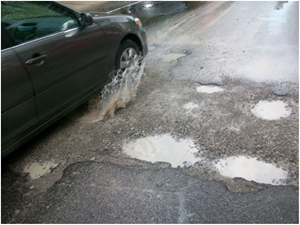
Crossing the road can be a risky undertaking. With cars travelling in both directions, not to mention cyclists and trucks, there are number of hazards to keep an eye out for. Yet, what happens when a road has pot holes? Is it up to the pedestrian to keep an eye out or do the authorities have a duty of care to ensure roads are properly maintained?
A new public liability injury claim from New South Wales has shed light on this question and the procedure for seeking damages against a government agency.
Damages sought after fall
In 2013, the plaintiff was on her way to work early in the morning. It had been raining heavily that night, which had continued into a light rain that morning. As such, the road was wet and any potholes were disguised, being filled with water.
After crossing the road, the plaintiff became aware that she had left her bus pass in the car. As she turned to make her way back, the plaintiff stepped in a pothole and fell. She landed on her hands, hip and knees.
As a result of the fall, she was transported to a hospital and admitted with fractures in both feet. After CT scans she was fitted with medical “moon boots” and was off work for six weeks.
The case concluded with the Court awarding the plaintiff close to $40,000 in respect to a number of categories, which included non-economic loss.
Roads and Maritime Services (RMS) owe a duty of care
The case highlights that it is not just companies and enterprises that owe a duty of care to people who enter their premises. Government agencies that are tasked with the maintenance and upkeep of roads are also responsible for the care of people that use it.
The defendant (RMS) admitted it beached its care of duty, and was found as a professional negligence case as it did not properly maintain a satisfactory state of its roads.
If you find yourself in a similar position, it is important to talk to a personal injury lawyer who can assess whether you have a viable claim.
At Gerard Malouf and Partners, we offer a no win no fee guarantee that removes upfront costs. Instead, our experts receive payment from the successful settlement you receive through your claim. If you would like to know more, contact a lawyer at Gerard Malouf and Partners.

